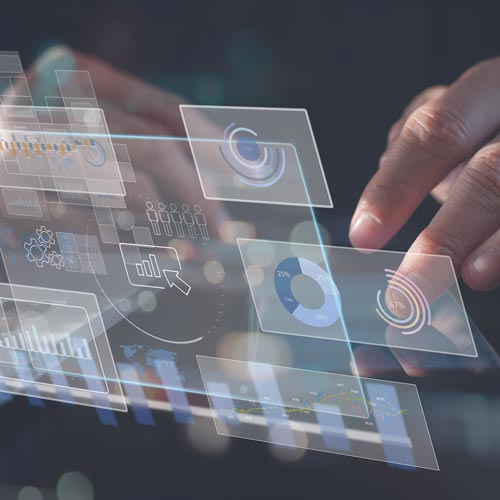Fast-advancing AI technology is impacting almost every white collar industry, and accounting is no exception. Although some traditional accounting job functions are vulnerable to automation, other parts of the job still need a human touch.
Since the launch of ChatGPT at the end of 2022, governments and businesses have been rushing to grapple with the implications of AI on the world of work. There has been no shortage of bold predictions regarding the magnitude of this impact: according to the technologist and billionaire Elon Musk, speaking at the UK’s AI safety summit in November, AI is “the most disruptive force in history” that will ultimately render all jobs obsolete.
Of course, businesses developing AI tools are incentivised to exaggerate their potential power to drive interest in their products. However, it’s undeniable that AI is already impacting work across a wide range of industries. Accounting is no exception.
Automating repetitive tasks
One of AI’s biggest strengths is its ability to process data. It’s unsurprising, then, that according to the World Economic Forum’s Future of Jobs 2023 report, data entry clerks are expected to suffer the highest level of absolute job losses of any profession, with eight million jobs at risk over the next five years.
There are aspects of an accountant’s role that involve repetitive tasks which can be effectively automated by AI. One example is bookkeeping or recording transactions. Thanks to computer vision, a field of AI that allows computers to ‘see’ and derive information from images, the process of extracting transaction data from receipts can be made automatic, along with other tasks like bank reconciliation, expenses and processing invoices. Tools like Expensify have made this technology widely available and accessible.
Large language models (LLMs) – the technology that powers tools like ChatGPT and Google’s Bard – are excellent at processing large amounts of data and spotting patterns that would take many hours of manual work to identify. This makes it useful for numerous accounting tasks, including fraud detection and even predictive analysis, which uses past data to forecast future patterns.
AI’s generative abilities also make it much easier to create visualisations from complex data. Charts and graphs that do the crucial job of explaining financial concepts to clients and other non-experts previously required specialist skills to generate. Now, these can be created with nothing but a prompt delivered in natural language.
Time to think
If many of the tasks that used to occupy accountants can now be automated, what does the future hold for the profession? According to the ‘big four’ accounting firms, the answer is augmentation of human accounting roles, not replacement.
Free from the time-sink of repetitive work, accountants will be able to think more strategically and holistically, taking a proactive approach to a client’s needs. While AI is excellent at crunching data and drawing out patterns, context, experience and human empathy are required to make decisions based on them. Client relations – and the associated soft skills required – are likely to become an increasingly important part of an accountant’s day-to-day work.
More time will also allow accountants to develop new skills. This might mean specialising in a particular area of accounting, such as forensic accounting or tax, or spending time improving IT skills. Although a big factor in the recent AI boom has been how the ‘chatbot’ format makes the technology easier than ever before to interact with – some tools, particularly enterprise-focused ones can be complex to use. A good grasp of them will help you stand out.
"According to the ‘big four’ accounting firms, the answer is augmentation of human accounting roles, not replacement"
Cause for caution
As with any rapidly advancing technology, there are potential pitfalls that accountants should be aware of when using AI tools. Perhaps chief among these is algorithmic bias. AI tools are trained on vast amounts of human-generated data, and are therefore prone to perpetuating inequality by reproducing these biases in their outputs. The way that many of these tools work, however, means they are “black boxes” with opaque processes. This underlines the importance of human judgement in partnership with AI.
Another crucial aspect is data security. Accountants work with highly sensitive data, so ensuring that this data is secure is of the utmost importance. Web or cloud-based AI tools often host data on external servers, putting it at greater risk of unauthorised access. Privacy and security-focused options like ChatGPT Enterprise can mitigate risk, but awareness is still crucial.
Similar uncertainty surrounds the legal and regulatory status of many AI tools. Many generative AI companies are facing law suits over the sources of their tools’ training data and its copyright status. Over-reliance on tools that could materially change in the future as a result of legal or regulatory rulings could cause accountants problems.
One downside to the automation of repetitive tasks is that it makes it more difficult for junior accountants to build up experience. This is a problem that extends beyond the accounting industry, affecting junior lawyers and software developers too.
Like the majority of white-collar job roles, AI is likely to significantly change what an average day looks like for an accountant. Technology has impacted accounting before, however. The key for accountants is to engage with it and explore its capabilities with an open mind.
